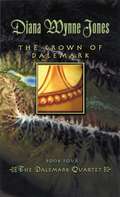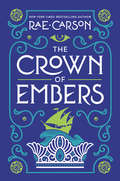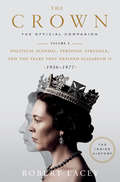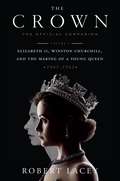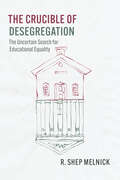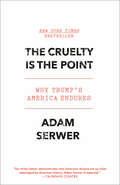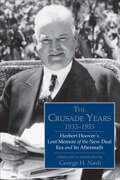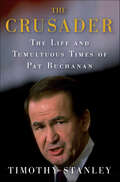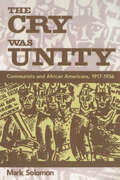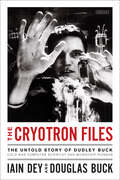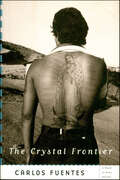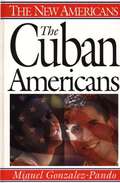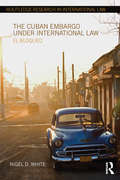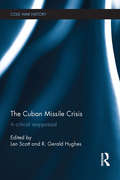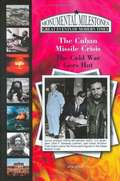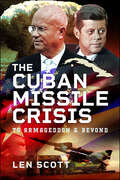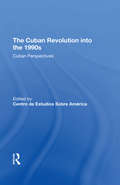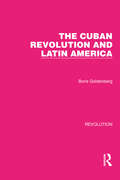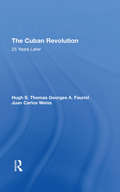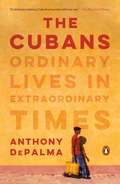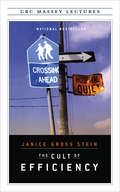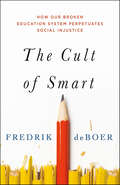- Table View
- List View
The Crown of Dalemark
by Diana Wynne JonesWhen this final book of Diana Wynne Jones's quartet of novels about the mythical kingdom of Dalemark was published in 1995, it earned the Mythopoeic Fantasy Award for Children's Literature. The Crown of Dalemark continues the adventures of Mitt after his flight from Holand as a fugitive accused of attempted murder. Since his arrival in the North of Dalemark, Mitt has become disillusioned. The North seems no more free than the South from which he came. And now he has been given an order to kill someone he doesn't even know, or else risk the lives of his friends. Forced once more to flee, Mitt is joined by Moril, the quietly powerful musician, and Maewen, out of her time but mysteriously fated to play a part in their quest. For the evil powers of the mage Kankredin are re-assembling, and only the Adon's gifts-the ring, sword, and cup-can reunite Dalemark. The Countess and Lord Keril send Mitt to kill a young woman Noreth Onesdaughter, who claims to know where the lost crown is hidden.
The Crown of Embers (Girl of Fire and Thorns #2)
by Rae CarsonHero. Foreigner. Queen. Elisa, at the age of seventeen, is all three. And all three draw enemies. Faced with assassins, court politics, and the threat of civil war, Elisa despairs of being the ruler her people need. Her only hope is the Godstone. She must master its power once and for all. She finds clues hidden in a long forgotten--and forbidden--scripture. Accompanied by a one-eyed warrior, an enemy defector, and the man she is falling in love with, Elisa takes a leap of faith and crosses an ocean in search of the ultimate source of the Godstone's power. But her faith has always had a price, and doing the right thing might mean giving up the power she desperately needs. And it might mean giving up the man she desperately loves. Rae Carson continues the epic story begun in The Girl of Fire and Thorns with a novel that is remarkable, adventurous, and even more romantic than the first.
The Crown: Political Scandal, Personal Struggle, and the Years that Defined Elizabeth II (1956-1977) (The Crown #2)
by Robert LaceyThe fascinating royal and social history that inspired seasons 2 and 3 of The Crown, written by the show&’s historical consultant. In this eye-opening companion to seasons 2 and 3 of Netflix&’s acclaimed series The Crown, renowned biographer—and the show&’s historical consultant—Robert Lacey takes us through the real history that inspired the drama. Covering two tumultuous decades in the reign of Queen Elizabeth II, Lacey looks at the key social, political, and personal moments and their effects—not only on the royal family but also on the world around them. From the Suez Crisis and the U.S.–Soviet space race to the legacy of the Duke of Windsor&’s collaboration with Hitler, along with the rumored issues with the royal marriage, the book provides a thought-provoking insight into the historic decades that the show explores, revealing the truth behind the on-screen drama. Extensively researched and complete with beautifully reproduced photographs, this is a unique look behind the history that inspired the show and the years that would prove to be the making of the Queen.The Crown is now available to watch on Netflix.The Crown is produced by Left Bank Pictures in association with Sony Pictures Television for Netflix.
The Crown: The Official Companion, Volume 1: Elizabeth II, Winston Churchill, and the Making of a Young Queen (1947-1955) (The Crown #1)
by Robert LaceyThe official companion to the Emmy-winning Netflix drama chronicling the reign of Queen Elizabeth II, and starring Claire Foy and John Lithgow, The Crown by Peter Morgan, featuring additional historical background and beautifully reproduced archival photos and show stills <P><P>Elizabeth Mountbatten never expected her father to die so suddenly, so young, leaving her with a throne to fill and a global institution to govern. <P>Crowned at twenty-five, she was already a wife and mother as she began her journey towards becoming a queen. <P> As Britain lifted itself out of the shadow of war, the new monarch faced her own challenges. <P>Her mother doubted her marriage; her uncle-in-exile derided her abilities; her husband resented the sacrifice of his career and family name; and her rebellious sister embarked on a love affair that threatened the centuries-old links between the Church and the Crown. <P>This is the story of how Elizabeth II drew on every ounce of resolve to ensure that the Crown always came out on top. <P>Written by the show’s historical consultant, royal biographer Robert Lacey, and filled with beautifully reproduced archival photos and show stills, The Crown: The Official Companion: Volume 1 adds expert and in-depth detail to the events of the series, painting an intimate portrait of life inside Buckingham Palace and 10 Downing Street. <P>Here is Elizabeth II as we’ve never seen her before.
The Crucible of Desegregation: The Uncertain Search for Educational Equality (Chicago Series in Law and Society)
by R. Shep MelnickExamines the patchwork evolution of school desegregation policy. In 1954, the Supreme Court delivered the landmark decision of Brown v. Board of Education—establishing the right to attend a desegregated school as a national constitutional right—but the decision contained fundamental ambiguities. The Supreme Court has never offered a clear definition of what desegregation means or laid out a framework for evaluating competing interpretations. In The Crucible of Desegregation, R. Shep Melnick examines the evolution of federal school desegregation policy from 1954 through the termination of desegregation orders in the first decades of the twenty-first century, combining legal analysis with a focus on institutional relations, particularly the interactions between federal judges and administrators. Melnick argues that years of ambiguous, inconsistent, and meandering Court decisions left lower court judges adrift, forced to apply contradictory Supreme Court precedents in a wide variety of highly charged political and educational contexts. As a result, desegregation policy has been a patchwork, with lower court judges playing a crucial role and with little opportunity to analyze what worked and what didn’t. The Crucible of Desegregation reveals persistent patterns and disagreements that continue to roil education policy.
The Cruelty Is the Point: The Past, Present, and Future of Trump's America
by Adam SerwerFrom an award-winning journalist at The Atlantic, these searing essays make a damning case that cruelty is not merely an unfortunate byproduct of the Trump administration but its main objective and the central theme of the American project. <P><P> Like many of us, Adam Serwer didn’t know that Donald Trump would win the 2016 election. But over the four years that followed, the Atlantic staff writer became one of our most astute analysts of the Trump presidency and the volatile powers it harnessed. The shock that greeted Trump’s victory, and the subsequent cruelty of his presidency, represented a failure to confront elements of the American past long thought vanquished. In this searing collection, Serwer chronicles the Trump administration not as an aberration but as an outgrowth of the inequalities the United States was founded on. <P><P> Serwer is less interested in the presidential spectacle than in the ideological and structural currents behind Trump’s rise—including a media that was often blindsided by the ugly realities of what the administration represented and how it came to be. While deeply engaged with the moment, Serwer’s writing is also haunted by ghosts of an unresolved American past, a past that torments the present. In bracing new essays and previously published works, he explores white nationalism, myths about migration, the political power of police unions, and the many faces of anti-Semitism. <P><P> For all the dynamics he examines, cruelty is the glue, the binding agent of a movement fueled by fear and exclusion. Serwer argues that rather than pretending these four years didn’t happen or dismissing them as a brief moment of madness, we must face what made them possible. Without acknowledging and confronting these toxic legacies, the fragile dream of American multiracial democracy will remain vulnerable to another ambitious demagogue. <P><P><b>A New York Times Best Seller</b>
The Crusade Years, 1933–1955: Herbert Hoover's Lost Memoir of the New Deal Era and Its Aftermath
by George H. Nash Editor Herbert HooverCovering an eventful period in Herbert Hoover's career—and, more specifically, his life as a political pugilist from 1933 to 1955—this previously unknown memoir was composed and revised by the 31st president during the 1940s and 1950s—and then, surprisingly, set aside. This work recounts Hoover's family life after March 4, 1933, his myriad philanthropic interests, and, most of all, his unrelenting “crusade against collectivism” in American life. Aside from its often feisty account of Hoover's political activities during the Roosevelt and Truman eras, and its window on Hoover's private life and campaigns for good causes, The Crusade Years invites readers to reflect on the factors that made his extraordinarily fruitful postpresidential years possible. The pages of this memoir recount the story of Hoover's later life, his abiding political philosophy, and his vision of the nation that gave him the opportunity for service. This is, in short, a remarkable saga told in the former president's own words and in his own way that will appeal as much to professional historians and political scientists as it will lay readers interested in history.
The Crusader: Ronald Reagan and the Fall of Communism
by Paul KengorBased on extraordinary research: a major reassessment of Ronald Reagan's lifelong crusade to dismantle the Soviet Empire–including shocking revelations about the liberal American politician who tried to collude with USSR to counter Reagan's efforts Paul Kengor's God and Ronald Reagan made presidential historian Paul Kengor's name as one of the premier chroniclers of the life and career of the 40th president. Now, with The Crusader, Kengor returns with the one book about Reagan that has not been written: The story of his lifelong crusade against communism, and of his dogged–and ultimately triumphant–effort to overthrow the Soviet Union. Drawing upon reams of newly declassified presidential papers, as well as untapped Soviet media archives and new interviews with key players, Kengor traces Reagan's efforts to target the Soviet Union from his days as governor of California to the fall of the Berlin Wall and the collapse of what he famously dubbed the "Evil Empire." The result is a major revision and enhancement of what historians are only beginning to realize: That Reagan not only wished for the collapse of communism, but had a deep and specific understanding of what it would take––and effected dozens of policy shifts that brought the USSR to its heels within a decade of his presidency. The Crusader makes use of key sources from behind the Iron Curtain, including one key memo that implicates a major American liberal politician–still in office today–in a scheme to enlist Soviet premier Yuri Andropov to help defeat Reagan's 1984 reelection bid. Such new finds make The Crusader not just a work of extraordinary history, but a work of explosive revelation that will be debated as hotly in 2006 as Reagan's policies were in the 1980s.
The Crusader: The Life and Tumultuous Times of Pat Buchanan
by Timothy StanleyThe Crusader tells the fascinating life story of Pat Buchanan, the three-time presidential candidate, Nixon confidant, White House communications director during Iran-Contra, pundit, and bestselling author.Buchanan is one of America's most controversial conservative rebels. After serving Nixon and Reagan, he led a revolt against the Republican establishment that was a forerunner for the Tea Party. In 1992 he tried to take away his party's nomination from the incumbent president, George H. W. Bush. Although he lost, Buchanan set the tone for political debate for the next two decades when he declared a "cultural war" against liberalism and a jihad on Republican moderates. Throughout the 1990s, his radical, rollicking presidential campaigns tore apart the GOP and articulated the hopes and fears of a new generation of Middle American conservatives. This balanced, and often funny, biography explores the highs and lows of Buchanan's career, from his stunning victory in the 1996 New Hampshire primary to his humiliating "grudge match" against Donald Trump in the 2000 Reform Party contest. At its heart is a man who embodies the contradictions of the conservative movement: a wealthy bookworm who branded himself as an everyman reactionary, a Republican insider who became a populist outsider, a patriarch whose campaigns were directed by his sister, a socially unacceptable ideologue who won the affection of liberals and conservatives alike—Rachel Maddow, Ralph Nader, Eugene McCarthy, Ron Paul, even Mel Gibson.Timothy Stanley tells the intimate story of the man who defined the culture war for a generation of Americans with outrage and wit; the man who, when asked what he thought about gun control, replied, "I think it's important to have a steady aim."
The Cry Was Unity: Communists and African Americans, 1917-1936
by Mark SolomonThe Communist Party was the only political movement on the left in the late 1920s and 1930s to place racial justice and equality at the top of its agenda and to seek, and ultimately win, sympathy among African Americans. This historic effort to fuse red and black offers a rich vein of experience and constitutes the theme of The Cry Was Unity. Utilizing for the first time materials related to African Americans from the Moscow archives of the Communist Inter-national (Comintern), The Cry Was Unity traces the trajectory of the black-red relationship from the end of World War I to the tumultuous 1930s. From the just-recovered transcript of the pivotal debate on African Americans at the 6th Comintern Congress in 1928, the book assesses the impact of the Congress's declaration that blacks in the rural South constituted a nation within a nation, entitled to the right of self-determination. Despite the theory's serious flaws, it fused the black struggle for freedom and revolutionary content and demanded that white labor recognize blacks as indispensable allies. As the Great Depression unfolded, the Communists launched intensive campaigns against lynching, evictions, and discrimination in jobs and relief and opened within their own ranks a searing assault on racism. While the Party was never able to win a majority of white workers to the struggle for Negro rights, or to achieve the unqualified support of the black majority, it helped to lay the foundations for the freedom struggle of the 1950s and 1960s. The Cry Was Unity underscores the successes and failures of the Communist-led left and the ways in which it fought against racism and inequality. This struggle comprises an important missing page that needs to be returned to the nation's history.
The Cryotron Files: The Untold Story Of Dudley Buck, Pioneer Computer Scientist And Cold War Government Agent
by Iain Dey Douglas BuckThe riveting true story of Dudley Buck, the American computer scientist whose pioneering work with microchips placed him firmly in the sights of the KGB Dr. Dudley Allen Buck was a brilliant young scientist on the cusp of fame and fortune when he died suddenly on May 21, 1959, at the age of 32. He was the star professor at MIT and had done stints with the NSA and Lockheed. His latest invention, the Cryotron—an early form of the microchip—was attracting attention all over the globe. It was thought that the Cryotron could guide a new generation of intercontinental ballistic missiles to their targets. Four weeks before Dudley Buck’s death, he was visited by a group of the Soviet Union’s top computer experts. On the same day that he died from a mysterious sudden bout of pneumonia, his close colleague, Dr. Louis Ridenour, was also found dead from similar causes. Two top American computer scientists had unexpectedly died young on the same day. Were their deaths linked? Two years old when his father died, Douglas Buck was never satisfied with the explanation of his father’s death and has spent more than 20 years investigating it, acquiring his father’s lab books, diaries, correspondence, research papers and patent filings. Armed with this research, award-winning journalist Iain Dey tells, with compelling immediacy, the story of Dudley Buck’s life and groundbreaking work, starting from his unconventional beginnings in California through to his untimely death and beyond. The Cryotron Files is at once the gripping narrative history of America and its computer scientists during the Cold War and the dramatic personal story of rising MIT star Dudley Buck in the high-stakes days of spies, supercomputers, and the space and nuclear race.
The Crystal Frontier: A Novel in Nine Stories
by Carlos FuentesThe nine stories comprising The Crystal Frontier, a brilliant work of fiction from Carlos Fuentes, all concern people who in one way or another have had something to do with, or still are part of, the family of one Leonardo Barroso, a powerful oligarch of northern Mexico with manifold connections to the United States.
The Cuban Americans
by Miguel Gonzalez-PandoThis book focuses on the waves of Cuban refugees who have come to the United States since Fidel Castro rose to power in 1959. The author explores America's shifting response to the Cuban emigres and the ways immigration policy reflects U.S.-Soviet relations. Cuban American culture, including art, journalism, and film, are explored. The text is enriched by frequent quotes from the author's interviews with political and cultural figures in the Cuban American community.
The Cuban Embargo under International Law: El Bloqueo (Routledge Research in International Law)
by Nigel D. WhiteThe United States embargo against Cuba was imposed over fifty years ago initially as a response to the new revolutionary government's seizure of US properties, which was viewed by the US as a violation of international law. However, while sanctions can be legitimate means of enforcing established norms, the Cuban embargo itself appears to be the wrongful act, and its persistence calls into question the importance and function of international law. This book examines the history, legality and effects of US sanctions against Cuba and argues that the embargo has largely become a matter of politics and ideology; subjecting Cuba to apparently illegitimate coercion that has resulted in a prolonged global toleration of what appears to be a serious violation of international law. The book demonstrates how the Cuban embargo undermines the use of sanctions world-wide, and asks whether the refusal of world governments to address the illegality of the embargo reduces international law to tokenism where concepts of sovereign equality and non-intervention are no longer a priority. Despite the weaknesses of international law, Nigel D. White argues that in certain political conditions it will be possible to end the embargo as part of a bilateral agreement to restore normal relations between the US and Cuba and, furthermore, that such an agreement, if it is to succeed, will have to be shaped by the broad parameters of law and justice. As a fierce re-evaluation of international law through the story of a country under siege, this book will be of great interest and use to researchers and students of public international law, international relations, and US and Latin American politics.
The Cuban Missile Crisis: A Critical Reappraisal (Cold War History)
by Len Scott R. Gerald HughesThis volume brings together a collection of leading international experts to revisit and review our understanding of the Cuban Missile Crisis, via a critical reappraisal of some of the key texts. In October 1962, humankind came close to the end of its history. The risk of catastrophe is now recognised by many to have been greater than realised by protagonists at the time or scholars subsequently. The Cuban missile crisis remains one of the mostly intensely studied moments of world history. Understanding is framed and informed by Cold War historiography, political science and personal experience, written by scholars, journalists, and surviving officials. The emergence of Soviet (later Russian) and other national narratives has broadened the scope of enquiry, while scrutiny of the operational, especially military, dimensions has challenged assumptions about the risk of nuclear war. The Cuban Missile Crisis: A Critical Reappraisal brings together world leading scholars from America, Britain, France, Canada, and Russia to present critical scrutiny of authoritative accounts and to recast assumptions and interpretations. The book aims to provide an essential guide for students of the missile crisis, the diplomacy of the Cold War, and the dynamics of historical interpretation and reinterpretation. Offering original ideas and agendas, the contributors seek to provide a new understanding of the secrets and mysteries of the moment when the world went to the brink of Armageddon. This book will be of great interest to students of the Cuban missile crisis, Cold War Studies, nuclear proliferation, international history and International Relations in general.
The Cuban Missile Crisis: The Cold War Goes Hot
by Jim WhitingThe United States and the Soviet Union were the two main nations that defeated Nazi Germany in World War II. Yet their systems of government were completely different. These differences soon developed into the Cold War. Both sides became bitter enemies. But there was no actual fighting. That situation nearly changed in 1961. The Soviets secretly installed missiles with nuclear warheads in Cuba. These missiles could reach many cities in the United States. When President John F. Kennedy learned about these weapons, he confronted Soviet premier Nikita Khrushchev. The world teetered on the brink of a nuclear war. This is the story of that chilling event.
The Cuban Missile Crisis: Thirteen Days on an Atomic Knife Edge, October 1962 (Cold War, 1945–1991)
by Phil CarradiceThis gripping Cold War history chronicles the events that brough the world to the edge of nuclear war—and the political drama that averted disaster.The Cuban Missile Crisis of 1962 was the closest the world has yet come to nuclear war, a time when the hands of the Doomsday Clock really did inch towards the witching hour of midnight. By placing nuclear missiles on the Caribbean island of Cuba where, potentially, they were able to threaten the eastern seaboard of the USA, Nikita Khrushchev and the Soviet Union escalated the Cold War to a level that everyone feared but had never previously thought possible.In a desperate and dangerous game of brinkmanship, for thirteen nerve-wracking days Premier Khrushchev and President Kennedy held the fate of the world in their hands. Kennedy, in particular, wrestled with a range of options – allow the missiles to stay, launch an air strike on the sites, or invade Cuba. In the end, he did none of these. But the solution to one of the deadliest dilemmas of the twentieth century proved to be a brave and dramatic moment in human history.
The Cuban Missile Crisis: To Armageddon & Beyond
by Len ScottIt is sixty years since the events of October 1962 brought the world close to nuclear catastrophe. The Cuban missile crisis has long been recognized as the moment of greatest danger in the life (and near death) of humanity. In those sixty years, our knowledge and understanding of events have undergone significant change. There are some reasons to be encouraged, inasmuch as we have learned how both President John F. Kennedy and Premier Nikita Khrushchev sought to avoid nuclear war. More ominously, we have learned of incidents and events that suggest nuclear weapons might have been used by subordinate military commanders, in circumstances frequently unknown to their political leaders. Decisions whether to use nuclear weapons lay in the hands of often junior military commanders, some of whom were perilously close to crossing the nuclear threshold. This does not mean – as often assumed – that if some nuclear weapons were used, escalation to all-out war was inevitable. Yet the undoubted risk of thermonuclear war in these circumstances threatened the very survival of civilization. Hundreds, if not thousands, of millions of people would have died from immediate and short-term effects, while the longer-term prospect of a ‘Nuclear Winter’ portended the virtual extinction of humanity. Drawing lessons from sixty years ago faces significant challenges. If we draw lessons only to discover our understanding was mistaken, we might well have drawn the wrong lessons. Many received wisdoms about the crisis have been shown to be misleading. What is striking is how after forty or fifty or even sixty years, new evidence has emerged to challenge previously accepted explanations. It is for the reader to reach their own verdicts on the history of the crisis, and how much we owe to political leaders who averted catastrophe (as well as how their words and deeds helped create the crisis in the first place). It is for the reader to conclude how close we came to nuclear war. Whatever conclusions are reached, one overriding lesson looms large. However we judge the actions of political and military leaders, one factor was crucial in why we avoided nuclear war in 1962. It was luck. In October 1962, humanity was very lucky. Will we be so lucky next time?
The Cuban Revolution Into The 1990s: Cuban Perspectives
by Ronald H Chilcote Sobre America Centro De Estudios Sobre America Centro De Estudios Sobre America "Attn: Luis SuarezThe Cuban Revolution succeeded in 1959 in the face of official U.S. opposition, an abortive Bay of Pigs invasion, and an economic embargo. Cuban dependence on the United States dated to the U.S. occupation of the island from 1898 to 1901 and subsequent interventions in 1906-1909, 1912, and 1917. Historically, the Cuban economy has depended on the export of sugar. Before the revolution the United States imported the largest share of Cuban sugar; after 1960 the Soviet Union assumed this role, and in exchange Cuba had to import its fuel and some of its foodstuffs, raw materials, and capital goods.
The Cuban Revolution and Latin America (Routledge Library Editions: Revolution #8)
by Boris GoldenbergThis book, first published in 1965, is a scrupulously fair study of the origins and evolution of Castroism and an assessment of the impact of the Cuban revolution and of Castro’s subsequent domestic and foreign policies on the rest of Latin America. In this analysis it takes into account the great differences – social, economic and cultural – between the countries of the area and looks at the foreign policies of Latin American countries as well as the United States and the role of international Communism.
The Cuban Revolution: 25 Years Later
by Georges A Fauriol Juan Carlos Weiss Hugh Thomas Of Swynnerton Hugh S. ThomasJanuary 1984 marked the 25th anniversary of Fidel Castro’s emergence to power. The Cuban Revolution: 25 Years Later is a product of the CSIS Cuba Project, a long-term effort to focus public as well as policymaker’s attention on Cuba-related affairs. The lead author, Lord Thomas of Swynnerton, is the dean of political-historical studies on Cuba, and author of the encyclopedic Cuba: The Pursuit of Freedom. A great deal of myth surrounds the evolution of Cuba since Castro’s emergence to power over 25 years ago. Some of this myth is the product of official Cuban propaganda; some of it is also due to a generally misinformed American public. Sifting through available data to distinguish between fact and fiction, this book evaluates broadly the impact of Castro’s regime on Cuba itself. Based on the findings of the CSIS Cuba Project, the book draws on the assessments of 18 top Cuban specialists on the political, economic, cuiturai, and social development of Cuba since 1959. In contrast to democracies such as Costa Rica, the equalization of society that has taken place under Castro’s leadership has been accomplished by redistributing existing resources, not by creating new wealth. Moreover, the authors conclude that in politics, culture, and the economy, Cuba under Castro has become and remains rigid, stagnant, enormously militarized, and ideologically absolutist.
The Cubans: Ordinary Lives in Extraordinary Times
by Anthony DePalmaModern Cuba comes alive in a vibrant portrait of a group of families's varied journeys in one community over the last twenty years. <P><P>Cubans today, most of whom have lived their entire lives under the Castro regime, are hesitantly embracing the future. In his new book, Anthony DePalma, a veteran reporter with years of experience in Cuba, focuses on a neighborhood across the harbor from Old Havana to dramatize the optimism as well as the enormous challenges that Cubans face: a moving snapshot of Cuba with all its contradictions as the new regime opens the gate to the capitalism that Fidel railed against for so long. <P><P>In Guanabacoa, longtime residents prove enterprising in the extreme. Scrounging materials in the black market, Cary Luisa Limonta Ewen has started her own small manufacturing business, a surprising turn for a former ranking member of the Communist Party. Her good friend Lili, a loyal Communist, heads the neighborhood's watchdog revolutionary committee. <P><P>Artist Arturo Montoto, who had long lived and worked in Mexico, moved back to Cuba when he saw improving conditions but complains like any artist about recognition. In stark contrast, Jorge García lives in Miami and continues to seek justice for the sinking of a tugboat full of refugees, a tragedy that claimed the lives of his son, grandson, and twelve other family members, a massacre for which the government denies any role. In The Cubans, many patriots face one new question: is their loyalty to the revolution, or to their country? <P><P>As people try to navigate their new reality, Cuba has become an improvised country, an old machine kept running with equal measures of ingenuity and desperation. A new kind of revolutionary spirit thrives beneath the conformity of a half century of totalitarian rule. And over all of this looms the United States, with its unpredictable policies, which warmed towards its neighbor under one administration but whose policies have now taken on a chill reminiscent of the Cold War.
The Cuckoo's Egg
by Clifford StollWhen computers exist hacker's coexist. Cliff Stoll found that his system was being used by someone else. It took a while for him to realize that there was a hacker behind it. So he decided to unwind the mystery by some undercover work.
The Cult of Efficiency: Revised Edition (The CBC Massey Lectures)
by Janice Gross SteinWe live in an age dominated by the cult of efficiency. Efficiency in the raging debate about public goods is often used as a code word to advance political agendas. When it is used correctly, efficiency is important: it must always be part of the conversation when resources are scarce and citizens and governments have important choices to make among competing priorities. Even when the language of efficiency is used carefully, that language alone is not enough. Unilingualism will not do. We need to go beyond the cult of efficiency to talk about accountability. Much of the democratic debate of the next decade will turn on how accountability becomes part of our public conversation and whether it is imposed or negotiated. Janice Gross Stein draws on public education and universal health care, locally and globally, as flashpoints in the debate about their efficiency. She argues that what will define the quality of education from Ontario to India and the quality of health care from China to Alberta is whether citizens and governments can negotiate new standards of accountability. The cult of efficiency will not take us far enough.
The Cult of Smart: How Our Broken Education System Perpetuates Social Injustice
by Fredrik deBoerNamed one of Vulture’s Top 10 Best Books of 2020!Leftist firebrand Fredrik deBoer exposes the lie at the heart of our educational system and demands top-to-bottom reform.Everyone agrees that education is the key to creating a more just and equal world, and that our schools are broken and failing. Proposed reforms variously target incompetent teachers, corrupt union practices, or outdated curricula, but no one acknowledges a scientifically-proven fact that we all understand intuitively: Academic potential varies between individuals, and cannot be dramatically improved. In The Cult of Smart, educator and outspoken leftist Fredrik deBoer exposes this omission as the central flaw of our entire society, which has created and perpetuated an unjust class structure based on intellectual ability.Since cognitive talent varies from person to person, our education system can never create equal opportunity for all. Instead, it teaches our children that hierarchy and competition are natural, and that human value should be based on intelligence. These ideas are counter to everything that the left believes, but until they acknowledge the existence of individual cognitive differences, progressives remain complicit in keeping the status quo in place.This passionate, voice-driven manifesto demands that we embrace a new goal for education: equality of outcomes. We must create a world that has a place for everyone, not just the academically talented. But we’ll never achieve this dream until the Cult of Smart is destroyed.
